"We were a very poor family because my father died when I was very young. I only remember him as a shadow; his face never comes to my mind when I think of him. My two older brothers remember him just a little better than me; my younger brother has no recollection whatsoever. My mother had only been married six or seven years by the time my father died. To this day, I’ve never seen her without a τζεμπέρι on her head. She’s been wearing it, along with her black clothes, more than 40 years now. I left the village when I was twelve, after finishing primary school. I moved in with my uncle's family in Hania so that I could go to high school. On the one hand, it was very difficult to leave my mother; on the other hand, I knew - and she knew - that there was no other way. I had to leave, just like my older brothers did, and eventually my younger brother.
"I'm too old to be doing this," my aunt told me "but my brother's here, and I have to do something special for him."
"After I came to live in Hania, it was very easy to forget all the past hardships. Food was bought, not foraged or harvested, cooking was done with gas or electricity, not by lighting a wood fire. I didn't need to cart water to our house in λαίνες from the large well near the village square, or boil it to have a bath. There were doctors for every medical problem and a general hospital. In the village, there were no medical services at all. A doctor would come to the village once a week to write prescriptions and see patients. But if you broke your leg or caught fever or had any other problem at any other time, then you had to deal with it there and then using the local medicinal knowledge that was used in times of difficulty.
"Your παππου collected these same greens and sold them in Hania," my uncle from the US told me. "He simply removed the woody part from the askrolimbi, which made them lighter to carry; he didn't clean them like we're doing now."
"I remember once, when I was about eight years old, I had to help my brother carry a sack of olives to the mill. We had all spent the whole day collecting the olives off the ground, including my mother, to fill it up, and it was important to get the sack to the mill before nightfall. It was already beginning to get dark. The sack was lying on the ground next to the outhouse where the rabbit hutches were housed. We each picked up one side of the sack and made our way to the mill. Halfway there, I dropped the sack when sank heavily with a thud onto one of my legs. I was wearing flip-flops. I felt a tinge of pain in my toe, but I was laughing over the incident, while my brother called me butterfingers. Then I just picked up my end of the sack and we got it to the mill, and then went home. I didn't feel any pain until I sat down. While I was having dinner, I started crying because the pain had taken hold then, and by the end of the evening, I was howling in misery. But what could we do about pain then? Nothing seemed to be broken, I simply felt a pain, and the pain will eventually go away. I soaked my toe in tsikoudia but I still didn't sleep all night. The next day, my grandmother placed some crushed onions and garlic onto my toe, and wrapped up my leg in a bandage made of old cloth. Not that it did much, but at least I had the psychological satisfaction that something had been done for me, and I felt better.
The medicine cabinet in the village.
"I got used to the pain, which reached its climax and slowly diminished. My toenail gradually blackened and fell off, and a new one grew in its place. The incident was forgotten, just like all other incidents of illness. I can't remember any other children my age anyone having any serious trouble recovering from an illness or a fall. We all got sick, we all fell over, we all fell down, but we all got up again. All except one; he had cancer. Now that I have children myself, whenever they come up here to see their grandmother, I remind them that they must be careful what they get up to so as not to have an accident, because of the lack of medical care, something that we're so used to receiving these days for even trivial matters. We've lost the skill of taking care of ourselves in adverse conditions. Even though it was freezing in the village in winter, and we walked on the snow wearing flimsy shoes, our feet never froze. When we got colds and coughs, we'd make up a gargle with lemon juice, salt and rosemary, and tie a handkerchief soaked in tsikoudia (raki) round our neck. We never used pills. We knew how to take care of ourselves then.
While I was at the village, I had to keep a close eye on my children, who were mesmerised by the open fire of the παρασιά.
"When my son was very young, I'd leave him in the village with my grandmother for a few days in the summer. He liked it up here, because he could play freely, without the fear of traffic, in wide open spaces, surrounded by farm animals in a natural, almost untouched environment. He'd meet up with other children who'd come to the village for the summer, and he'd never get bored. One day while he was here, my mother lit the παρασιά because she wanted to boil some horta, which she had foraged in the area surrounding the grazing grounds. She normally uses the electric range for cooking in the small indoor kitchen, but horta can make a mess in a small area, and they need a lot of water to boil in, so she thought it would be better to boil them outdoors. Like most children, my son was intrigued by the fire, and he liked to watch it as it burned away, the embers changing colour as the flames leapt and crackled. She had warned him not to get too close, but children never listen to good advice! He had taken a stick and was poking the burning coal when a spark flared up and a piece of charred wood flew out of the fire and landed on his shoes. He was wearing open-toed plastic beach slippers. The heat of the coal was so great, that it melted the slipper and it stuck onto his skin. My mother pulled it off, but a clump of skin came off with it. He still has a scar to remind of him of this event. Since that day, he never played with fire again. Had I been there when this happened, I would have bundled him into the car and taken him to a doctor's surgery, where the plastic would have been surgically removed. Nothing really bad had happened to him; in fact, it was only to be expected: if you play with fire, you get burnt. But it does make you think about how easy it is to have an accident, and how difficult it is to deal with things once they get out of hand. You've got to have special skills to live up here, skills that people are forgetting these days, because they live an easier life.
"What a funny broom, Mum, does it work like a 'real' broom?" my daughter asked. I told her to try it out and see for herself.
"When I was living in the village, life did in fact seem easy, although this couldn't be further from the truth. It was like playing a real-life game most of the time. I couldn't see the hardships because everyone lived in the same way. We were poorer than the other village children due to my father's death, but it wasn't immediately evident to other people. We all ate the same kind of food, we all had similar clothes, we all had the same schoolbooks, we all went to the same church, we all lived in the same kind of houses.
Old village grandeur
"In retrospect, because we had no father, I suppose people felt more sorry for us, so we'd be treated with extra care. We'd be given an extra melomakarono or kourambie at Christmas, and we'd fill up our bottle with olive oil more quickly when we sang the carols, because everyone knew how poor we were. My mother had to do both the man's and the woman's work to make ends meet. She had to cook and clean for all of us, including my grandmother who lived with us, but she also had to warn money so that we could buy the things that weren't grown in the village, like sugar, coffee and rice. We'd all pitch in during our free time to help her. She picked olives to trade for olive oil, she'd forage for snails and horta, which she'd sell to the town dwellers. We'd collect the απομάζουδα (see photo below for an explanation) which is how we earnt our pocket money. With that money, we'd be able to buy a notebook for school or a new pencil from the general store in the village, or some αστακός sweets. Again, there was only one store of this kind, so everyone in the village would be using the same place to buy the same things.
How many olives do you see in this photo? They would form part of the απομάζουδα that my cousin (my age) collected for her pocket money. It isn't as easy as it sounds: in the not-too-distant past (we're talking about 30 years ago), not a single olive went wasted, unlike nowadays.To fill a bottle with απομάζουδα, my cousin told me that she needed to collect olives for a week after a school; all the schoolchildren in the village were doing the same thing! Apomazouda are still being collected in various parts of Greece; this is no longer done in Hania. The olives in the above photo are what didn't fall on the net after the mechanical harvest; the tree is located near the roadside, which explains the rubbish.
"What we couldn't buy was toys, and there weren't really many people in the village who could actually afford the toys that could be bought in Hania. In any case, all the children of the village would make their own toys, from whatever materials they could find. The boys made slings out of tree branches and an old piece of elastic and shot at birds. The girls made dolls out of walnut heads and a piece of old cloth or a sock. A spinning top made from an acorn would keep us busy for hours, unlike today's children who get bored with their new toys before the day is over. At Christmas, we'd collect acorn branches, pine cones and colouful berries to decorate our house. At Easter, we'd find birds' nests. It's amazing how active we were compared to children nowadays. We didn't have a television; electricity didn't come to the village until 1973. Until I moved to Hania, I never watched television.
My US uncle entertained my kids by showing them how to make a spinning top out of an acorn.
"The village population was already decreasing by the time I was born. After the war, people started moving away. At first, people moved to lower ground. My uncle got married to a woman in Souda, so I'd visit him there every now and then. That was my first encounter with some place close to Hania. Another uncle went to Athens, and from there, the United States. People were moving, they weren't staying. So it was only natural for me to move away when my time came. All my brothers left the village in order to be able to attend high school. I did the same. One of them came back to live in the village, another went on to university in Greece, and another went to the US where he was looked after by my American uncle while he studied there.
The school building in Kambi looks very new, but the last time it operated as a school was more than a decade ago.
"After high school, I got married, and we built a house on my husband's land in Souda, just off the main road leading to Kambi. In this way, the village never really seemed very far away in my mind. The road was steep but the buses served their purpose well. I'd go back to the village every weekend and all the holidays. I'd always be there to help my brothers during the olive harvest. Eventually I learnt to drive and would often visit my mother when my children were young. Now that they're older, they're busier with school activities, so they don't have the time to go up to the village for long. Now that I don't take them up there myself, I don't feel the need to go up there much either. I see my brothers every day in the town. I phone my mother every day to see how she is. She doesn't want to move down with us; she prefers the peace and solitude of the village to the hustle and bustle of the town, not to mention the confined spaces. She's fit and healthy now, but I always worry about what might happen in the future. Life isn't secure for anyone these days."
*** *** ***
Kambi is a valley located 25 minutes away by car from Hania, 500m above sea-level, in the district of Kerameia, named after its links to pottery (κεραμεικό = keramiko = ceramic). The village resembles a large valley (where it gets its name from: κάμποι = kambi = valleys) made up undulating hills, based at the foot of Lefka Ori, the mountain range that dominates the landscape of Hania. The name of the village is first mentioned in the official records of the island of Crete in 1577, at about the time when the Ottoman empire was taking hold in Greece; this suggests that people were leaving the lowlands to escape the repercussions of the Ottoman invasion. Census records mention that there were never any Muslims living in the area, which also provides further evidence for the theory that people left the lowlands to escape invaders. But the area was no doubt inhabited 600 years before that by shepherds from the Monastery of St John of Patmos, where they tended their flocks. There is also enough evidence from archaeological excavations that people lived here even in Minoan times, from the ceramic pieces found in the area.
The highlands of an area often become inhabited in times of difficulty, because the mountain regions are generally inhospitable terrain. Even my cousin, whose mother still lives in Kambi (or Kambous, as it is referred to in the accusative case in Greek), finds the relatively short car trip up the steep mountain road a challenge. At its height, Kambi and the surrounding neighbouring villages that make up the district of Kerameia had over 3600 inhabitants, according to the 1900 census (the previous census in 1881 showed more than 2700), with about 500 living in Kambous. By 1971, that figure had dwindled to 174 permanent residents; now there are no more than 40. My mother's family left the village permanently in the early 1960s. People do not move up to the mountains easily these days; the fear of an invasion has disappeared, and if it were to happen, the mountains won't necessarily keep the enemy at bay.
It feels to eerie to think that I had once sat at this kafeneio.
There is great interest being shown these days by Kambiotes (resident in the village, or not) to revive the area: the (disused) school and church buildings have been restored, and a cultural association has been formed. A restaurant operates year-round in the area. A number of books have been published in recent times concerning the history of the area, and newspaper articles appear every now and then. Many of the house owners have renovated their old homes, but they are still seen as places for a weekend retreat rather than a place to live, as are the newer houses being built on the surrounding ancestral lands.
All census information has been taken from Κάμποι: Η Ρίζα, by Μιχάλη Κατσανεβάκη-Mihalis Katsanevakis (Hania 1998). For another idea about life in Kambi one generation before this woman's, read Niko's story.
*** *** ***
HAPPY NEW YEAR
to all my readers. Thanks are due to all of you who have carried cans of golden syrup in your suitcases for me, sent me carbon-footprint-laden gingernuts and pineapple lumps for my afternoon cuppa coffee, the novel seeds for our Cretan garden and the lovely food and non-food gifts. I've lost track of all the times I've found presents waiting for me in my mailbox. I hope I can continue to entertain you, even if it won't be as regularly as before; see you in a week or two...
ΚΑΛΗ ΧΡΟΝΙΑ ΣΕ ΟΛΟΥΣ
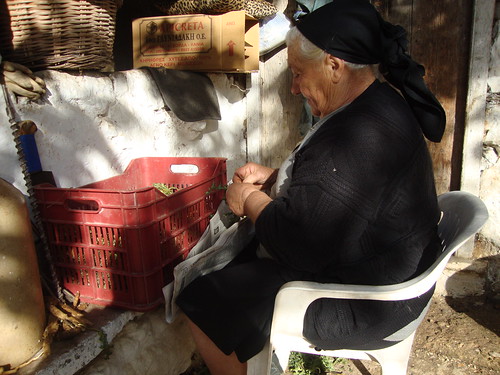
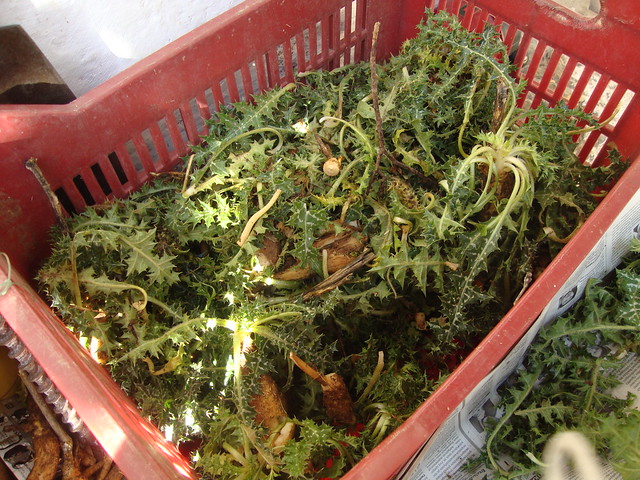
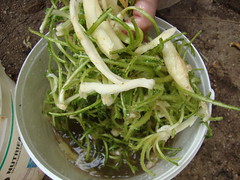
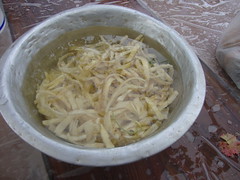
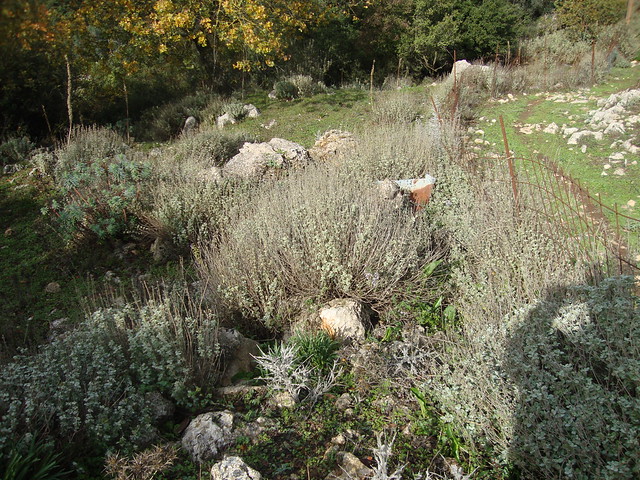
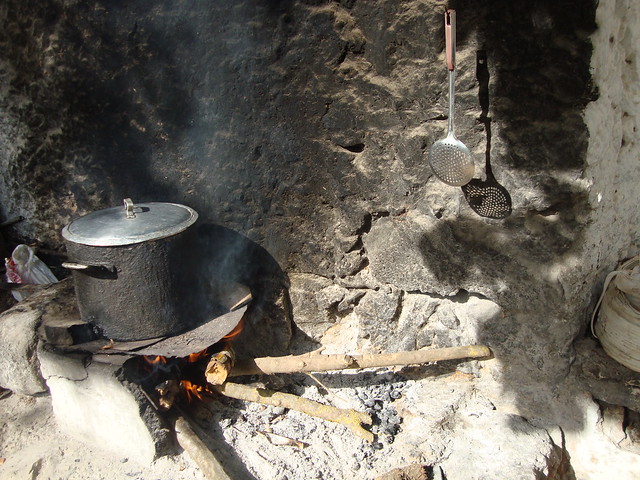
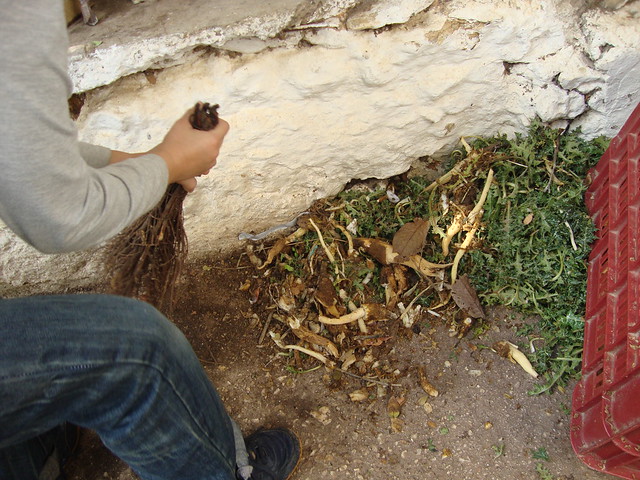
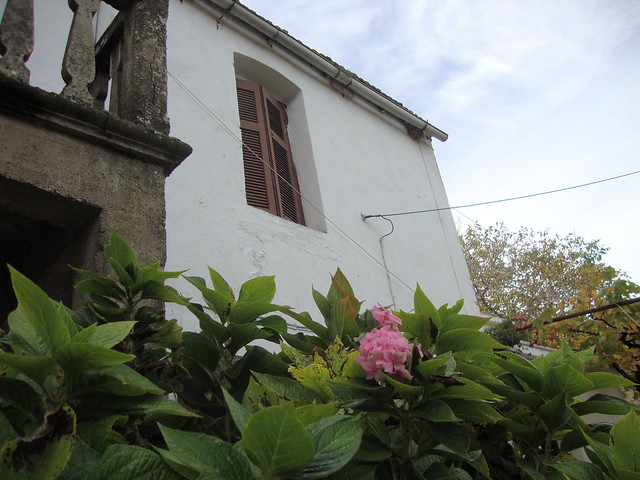
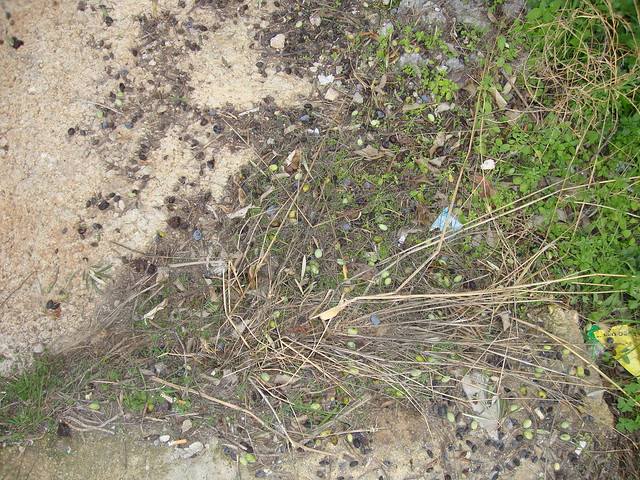
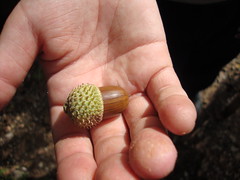
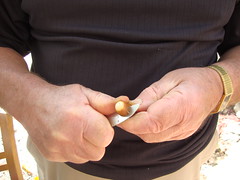
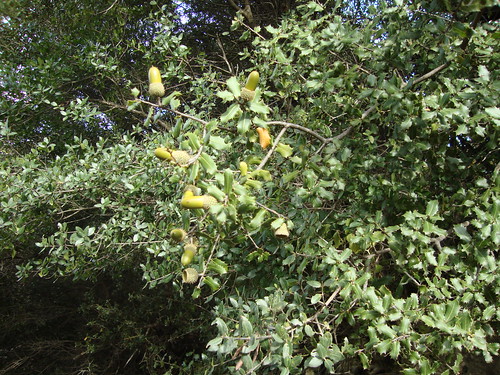

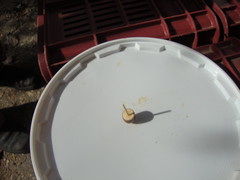
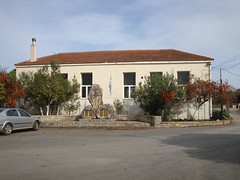
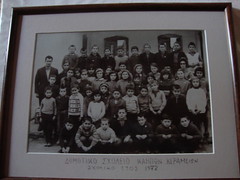
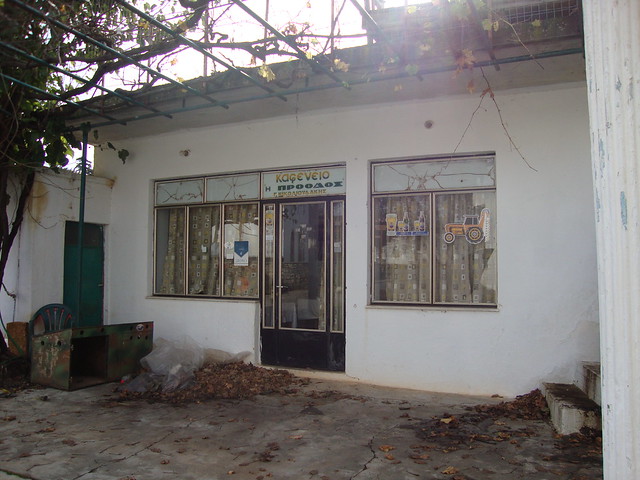
Ahhh Maria, I love these posts!
ReplyDeleteWonderful post Maria! May you live a long live in good health and happiness. Happy New Year!
ReplyDeleteLove the first picture. Wow, looks like a postcard!
ReplyDeleteΠέρασα να ευχηθώ καλή χρονιάααα!
ReplyDeleteGeia sou Maria,
ReplyDeleteKambi is a nice and very friendly village, which we often visit. The first time, I remember, the road was in a very bad condition and I guess I said some bad words as we at that time had a new car. I would never go there again.x`¤#"!>/&%¤
A couple of years later we rented a jeep and went up there again and this time the road was ok( well even for a new car).
The views from the road are very nice and the nature is fantastic.
We stopped just in front of the closed kafenion and saluted an old couple working with cutting the branches from the trees. We had a nice chat( I know a lttle from the language) and the old man told us all about why they cut those branches and how they used them. His wife went over to the their house, just opposite the kafenion, and was after a minute back with raki and sweets.It is so easy to get new friends in the villages of Crete. They showed us their house and animals and we really enjoyed the company of this old couple. Of course they were sorry about all the young people leaving the village.
It would be nice if it was possible to revive a village like Kambi and I really wish the people good luck in their effort.
We, my wife Sofia and I wish You,Your family and the people of Kambi A HAPPY NEW YEAR.
Greetings from Sweden
lars
Μαρία, Καλή Χρονιά να έχεις, με υγεία κι ευτυχία για σένα και την οικογένειά σου!
ReplyDeleteHi Maria! Lovely post!!
ReplyDeleteHave a Happy and Successful New Year!! Wish you all the best!!
Long time no see... Horus and Sobek wait for you at Kom Ombo… ;)
Enjoy!
Maria, what an interesting post! It seems you have learned a lot from your mother. That will serve you well in the future. I think we all should learn how to grow our own food and to forage. Life may be very different in the future.
ReplyDeleteYou write a very fascinating blog!
Thank you and Happy New Year!